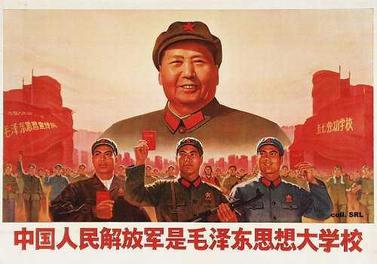
In 1966, Mao Zedong, leader of the ruling Communist Party in China, launched the Cultural Revolution. This social movement was intended to rid China of foreign and traditional influence while instilling the flame of revolutionary spirit in Chinese citizens. Specifically the movement targeted people belonging or formerly belonging to one of the Five Black categories (landlords, rich farmers, counter-revolutionaries, bad-influencers, and rightists) in addition to the Four Olds (old ideas, old culture, old habits, and old customs).
The Cultural Revolution had a profound impact on the Chinese population. Many youth joined the Red Guard, a student-led movement that, among other things, burned old books, renamed streets with revolutionary names, initiated re-education programs at schools, and hosted struggle sessions, where resistors of the Cultural Revolution were verbally and physically abused in public. Many intellectuals and counter-revolutionaries were sent to re-education camps in the countryside, where they learned from peasants how to embrace Communism. During this time the Communist party built up a personality cult around Mao Zedong, requiring citizens to put pictures of Mao in their homes and carrying around Mao’s Little Red Book, a collection of sayings.
This ten-year-period of Chinese history has inspired numerous memoirs and novels, especially by those who grew up during the Cultural Revolution. Here are five memoirs and novels with present different perspectives on this social movement that are definitely worth reading
- Red Scarf Girl by Ji-li Jiang

In the summer of 1966, Ji-li Jiang is a hard-working, intelligent middle schooler eager to support the Communist Party. She intends to audition for the Central Liberation Army Arts Academy but decides against it after her parents reveal that her grandfather belonged to one of the Five Black categories, which would prevent Ji-li from joining even if she passed the audition. As the Cultural Revolution picks up, Ji-li witnesses students turning on teachers and the destruction of all things considered old and traditional. She attempts to join the Red Guards, but her class background prevents her and Ji-li must make difficult choices between her own future and her family.
This memoir is written for a YA audience, but can be enjoyed by any age. It explores themes of exclusion and belonging, betrayal, family responsibilities, and political corruption. It specifically shows the perspective of someone who wants to participate in the Cultural Revolution but is held back by her family background.
- Revolution Is Not a Dinner Party by Ying Chang Compestine

Nine-year-old Ling Chang is the daughter of prominent doctors in Wuhan. Their status as upper class makes their life very difficult during the Cultural Revolution, especially when Comade Li, a political officer, moves in next door. At school Li is bullied by other students for her “bourgeoise” background and around her she witnesses neighbours taken away as “counter-revolutionaries”. Though her family outwardly feigns loyalty to the Communist party and Chairman Mao, Ling lives in constant fear that her father will be taken prisoner.
Though a fictional novel, Revolution Is Not a Dinner Party is based on Ying Chang Compestine’s own childhood during the Cultural Revolution and illustrates the difficulties faced by middle and upper class families.
- Wild Swans by Jung Chang

As a multi-generational family autobiography, Wild Swans is not exclusively about the Cultural Revolution, but presents life in China in the decades leading up to the Cultural Revolution and the years following. The book begins with Jung Chang’s grandmother, who grows up with bound feet in a poor family before the communist revolution. Eventually her father arranges for her to become the concubine of a general. The next section focuses on Chang’s mother, who works for the Communist Party and rises through the ranks as a loyal Party member. The final section tells Chang’s own story, beginning when she is a teenager during the Cultural Revolution. Chang quickly joins the Red Guard but gradually becomes disillusioned with Mao and the Communist Party as her father is persecuted for political dissension.. The book concludes with Chang’s feelings after the death of Mao.
Wild Swans is an enthralling nonfiction read that displays many different aspects of life in China during the 20th century.
- The Cowshed: Memories of the Chinese Cultural Revolution by Ji Xianlin

Ji Xianlin was born several decades before the Communist Revolution. A scholar of Eastern languages, notably Sanskrit, he became a professor at Peking University just a year into the Communist Revolution. During the Cultural Revolution, he was persecuted as an intellectual. Many of his possessions were confiscated or destroyed and he spent hours at struggle sessions, forms of public forms of humiliation that involved verbal and physical abuse. Finally he was imprisoned in a cowshed with other intellectuals.
While many books about the Cultural Revolution focus on childhood and coming-of-age during the Cultural Revolution, this memoir depicts the fate of a university professor who suffers harassment, humiliation, and finally imprisonment.
- Snow Falling in Spring: Coming of Age in China During the Cultural Revolution by Moying Li

Moying Li’s family eagerly supports the Communist Party. Her father even works as a screenwriter for Communist propaganda films. Yet this isn’t enough to protect them during the Cultural Revolution. Li’s family is targeted for their education and appreciation of Western entertainment and eventually Li’s father is taken away to a labor camp. But even from a labor camp, Moying’s father encourages her to continue her education and Moying secretly seeks out banned Western books.
This moving memoir explores betrayal and disillusionment as Moying watches her family torn apart by the government they once so enthusiastically supported.
These five books are great reads for anyone seeking first-hand accounts about life in 20th century China!